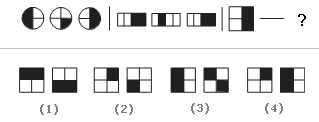Discussion
Home ‣ Logical Reasoning ‣ Analogies See What Others Are Saying!
- Question
WAITRESS : RESTAURANT
Options- A. doctor : diagnosis
- B. actor : role
- C. driver : truck
- D. teacher : school
- E. author : book
- Correct Answer
- teacher : school
ExplanationA waitress works in a restaurant; a teacher works in a school. - 1. Here are some words translated from an artificial language.
tamceno means sky blue
cenorax means blue cheese
aplmitl means star bright
Which word could mean "bright sky"?
Options- A. cenotam
- B. mitltam
- C. raxmitl
- D. aplceno Discuss
- 2. Look carefully at the sequence of symbols to find the pattern. Select correct pattern:

Options- A. 1
- B. 2
- C. 3
- D. 4 Discuss
- 3. Statement: The end of a financial year is the ideal time to take a look at the performance of various companies.
Assumptions:
- All the companies take such a review at the end of a financial year.
- The performance data of various companies is available.
Options- A. Only assumption I is implicit
- B. Only assumption II is implicit
- C. Either I or II is implicit
- D. Neither I nor II is implicit
- E. Both I and II are implicit Discuss
- 4. The Pacific yew is an evergreen tree that grows in the Pacific Northwest. The Pacific yew has a fleshy, poisonous fruit. Recently, taxol, a substance found in the bark of the Pacific yew, was discovered to be a promising new anticancer drug.
Options- A. Taxol is poisonous when taken by healthy people.
- B. Taxol has cured people from various diseases.
- C. People should not eat the fruit of the Pacific yew.
- D. The Pacific yew was considered worthless until taxol was discovered. Discuss
- 5. Secretly is to openly as silently is to
Options- A. scarcely
- B. impolitely
- C. noisily
- D. quietly Discuss
- 6. Statements: All trucks fly. Some scooters fly.
Conclusions:
- All trucks are scooters.
- Some scooters do not fly.
Options- A. Only conclusion I follows
- B. Only conclusion II follows
- C. Either I or II follows
- D. Neither I nor II follows
- E. Both I and II follow Discuss
- 7. Statement: Nuclear power cannot make a country secure.
Courses of Action:
- We must stop further expenses on increasing our nuclear power.
- We must destroy our nuclear capability.
- We must concentrate on improving our diplomatic relations.
Options- A. Only I follows
- B. Only II follows
- C. Only III follows
- D. Only I and III follow Discuss
- 8. Statements: Prime age school-going children in urban India have now become avid as well as more regular viewers of television, even in households without a TV. As a result there has been an alarming decline in the extent of readership of newspapers.
Conclusions:
- Method of increasing the readership of newspapers should be devised.
- A team of experts should be sent to other countries to study the impact of TV. on the readership of newspapers.
Options- A. Only conclusion I follows
- B. Only conclusion II follows
- C. Either I or II follows
- D. Neither I nor II follows
- E. Both I and II follow Discuss
- 9. Look at this series: 544, 509, 474, 439, ... What number should come next?
Options- A. 404
- B. 414
- C. 420
- D. 445 Discuss
- 10. 3 8 13 18 23 28 33
Options- A. 39 44
- B. 38 44
- C. 38 43
- D. 37 42
- E. 33 38 Discuss
More questions
Correct Answer: mitltam
Explanation:
Tam means sky;
ceno means blue;
rax means cheese;
apl means star; and
mitl means bright. So,
mitltam means bright sky.
Correct Answer: 4
Explanation:
In each of the segments, the figures alternate between one-half and one-fourth shaded.
Correct Answer: Both I and II are implicit
Explanation:
Since both I and II follow from the given statement, so both are implicit.
Correct Answer: People should not eat the fruit of the Pacific yew.
Explanation:
Given the information presented, the only statement that could be considered true is that the fruit should not be eaten because it is poisonous. There is no support that taxol is poisonous or that taxol has cured anyone (choices a and b). There is no support for choice d.
Correct Answer: noisily
Explanation:
Secretly is the opposite of openly, and silently is the opposite of noisily. Choices a and b are clearly not the opposites of silently. (Choice d) means the same thing as silently.
Correct Answer: Neither I nor II follows
Explanation:
Since the middle term 'fly' is not distributed even once in the premises, no definite conclusion follows.
Correct Answer: Only III follows
Explanation:
The statement asserts that increasing defensive power does not ensure the safety of a country. It is equally important to maintain good relations with other countries as well. But this does not imply that the country should stop concentrating on increasing defensive power or destroy the existing power. Thus, only III follows.
Correct Answer: Neither I nor II follows
Explanation:
The statement concentrates on the increasing viewership of TV. and does not stress either on increasing the readership of newspapers or making studies regarding the same. So, neither I nor II follows.
Correct Answer: 404
Explanation:
This is a simple subtraction series. Each number is 35 less than the previous number.
Correct Answer: 38 43
Explanation:
In this simple addition series, each number is 5 greater than the previous number.
Comments
There are no comments.More in Logical Reasoning:
Programming
Copyright ©CuriousTab. All rights reserved.
